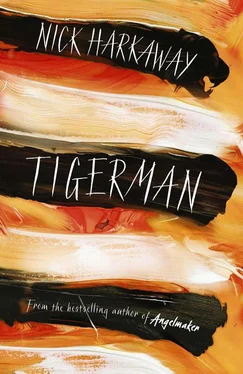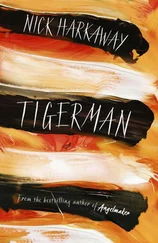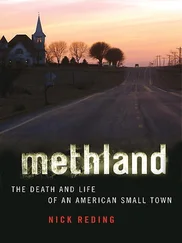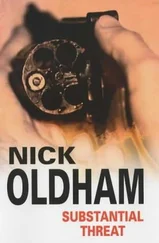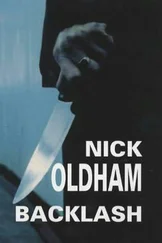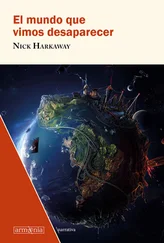The Sergeant’s technical approval did not stop him from batting the gun to one side and shattering the man’s face with the base of the copper pan. The man pulled the trigger as he went down, and one of his friends on the ground shrieked as he lost a toe. Well, such is combat (you murdering prick) .
The Sergeant saw movement and turned to find the boy poking another of the men on the floor in the eye with his comic book. Rolled tight, the comic was a stout wooden stick with a series of cookie-cutter edges at each end. The man screamed as his nerves reported the assault, and the boy kicked his gun away. The Sergeant hit the last man in the head, collected a gun and held it on them, counted: yes, five accounted for. His mouth tasted of bile and burning. He glanced out into the street: they had no backup.
Done.
And that was it. Five armed bandits versus a tween and a man having a quiet afternoon, and they’d won.
The boy looked around in wonder.
‘We’re alive!’ he said, and then again, Frankenstein style: ‘I am a-liiiive!’ The Sergeant wondered if this was shock, and thought it was, filtered through the boy’s weird, frenetic brain. ‘We pwn!’ the boy shouted. ‘We are alive and they are teh suxor!’
The Sergeant had only the vaguest idea what this meant. ‘Pwn’ was familiar, although he didn’t think you were supposed to say it out loud. Someone had explained it to him. He realised with a sickly feeling it had been Lieutenant Westcott, browsing his latest ebook in a Panther CLV, somewhere between Farah and Rudbar. Abruptly he was there as well as here. He knew he was remembering but couldn’t find the pause button. The playback just rolled on over the top of the men on the floor, the boy’s jubilant awareness of survival.
‘It’s a typo,’ Westcott had said. ‘They made it into a joke. You start with the simple statement “we won”. If you’re typing in a hurry, it might become “own”. Yes? And if you’re really going for it you might hit the wrong button altogether and get “pwn”. The lexicon is always growing. A lot of these games have chat channels as well as control keys, so that you can trashtalk the opposition. Like sledging’ — because cricket is always the clearest comparison. ‘So the kids type in a hurry because they’re under fire. Mostly war games, of course. The Americans use them to train the marines in teamwork, actually. Very forward-looking.’
The Sergeant had had a brief image of every sitting room in every town in the world becoming a training ground for marines. A wealth of potential recruits. Even more enemies. But there were always more enemies than allies, in video games. It had been that way since Space Invaders, which some people had actually wanted to ban on the grounds that it was wrong to suggest there were some fights you couldn’t win. You can always win, these people insisted, if you just go for it . Nike soldiering. Pep-talk strategy, and never mind the logistics, which will land you high and dry without food or body armour or even bullets. Real soldiers — soldiers like the ones in Hollywood films — could improvise a machine gun with a drainpipe and a bunch of clothespegs.
Like a man improvising a bomb with a tin of custard. He swayed, trying to remember what the real world looked like. The café. The café and Shola’s blood and bone everywhere and the smell of it. That was what it looked like now.
‘We are made from awesome!’ the boy said, hands on hips, hero style. Then memory took hold. In belated panic: ‘Shola?’
The Sergeant, about to indicate the corpse, remembered what it must look like and shook his head. He caught the boy’s arm as he went to see and held him back. The boy’s eyes widened and for a moment he grew stubborn, then limp.
‘Shola?’ he asked again. You have made a mistake. Someone else is dead. It is not our friend .
‘No,’ the Sergeant told him. He had had this conversation before, knew it very well. He looked around. How many corpses? Five? Six? Was anyone still alive? Any of them might be, except Shola. Shola was dead. But the others. . He should find out, try to stop the bleeding. He had no idea how to do that. In films, everyone knew those things, but he didn’t and he might make it worse. In the real world, platoons had medics, and ‘don’t fucking touch unless I say’. He looked at the gun and wondered why he wasn’t tempted to pull the trigger, finish the men on the ground. He wanted to want to. A few moments ago, if he’d had this gun, he would have used it without hesitating. Now it was out of the question. Pointless. And it was important to take prisoners. He wished it wasn’t.
‘We beat them,’ the boy protested. ‘We beat them!’
Yes. That much was true. In comics, and in the games the boy played, that meant that the key actors did not die. In the particoloured fantasy world of Superman, winning meant saving your friends. Ergo, Shola could not be dead. Except he was, and that too was bloody obvious and according to convention: when a white soldier goes adventuring, it’s somehow his black friend who gets shot.
‘We did what we could,’ the Sergeant said, hating the words in his mouth. ‘Everything we could. There’s nothing to feel ashamed about.’ This last with great fierceness and certainty because he knew what shame would do later, if not capped now. He reached for something which would make sense. ‘We needed Superman, didn’t we? Only he’s busy. It’s just us.’
The boy nodded in reluctant understanding. ‘We are good. We are not leet . Saving Shola would have been leet .’
Leet , the Sergeant thought, from ‘elite’, often written l33t or even 1337 . Meaning: the very best. The most able.
‘No,’ he said. ‘We are not leet .’
‘Perhaps we should practise,’ the boy murmured sadly.
‘Yes,’ the Sergeant agreed. He was rehearsing his choices in his mind, looking for better ones. Evade, counter-attack. There just weren’t any. Not once it started.
He heard a breath, looked down and saw the boy’s mouth open in a perfect O. He jerked back and around, looking for a sixth assassin, but there was nothing. The men on the ground cowered, begged. No threat. No threat. He looked back, abruptly afraid that the boy had been shot and was just now realising, grabbed him and checked him with his hands, moving aside folds of bloody clothing and patting the boy’s arms and legs. ‘Are you all right? Are you all right?’ His voice was uneven. Unprofessional. He was angry, the way his father had been angry with him when he burned himself on the kettle. ‘Tell me!’ He stopped shyly, worried that he had crossed a line.
‘I am fine,’ the boy said. ‘I am fine! I promise! Sorry. I did not mean to do that. It is okay. I was just seeing.’
‘Seeing what?’
‘Everything,’ the boy said. The Sergeant waited for him to crumple, but he didn’t. Instead he stared back at the room wide-eyed, as if he were visiting a cathedral. Shock looked like that sometimes. Survival became a miracle, the wretched world a heaven. Well. True enough .
Outside, someone was arriving. The cavalry. NatProMan, the Sergeant assumed, because explosions and gunfire would definitely attract Kershaw’s attention. Or perhaps he had called them. He didn’t remember. He looked down and saw the boy looking up, and realised that neither of them would cry unless the other one did first. He wondered what earthly good that was to anybody. Very manly. As much use as pulling the trigger, he supposed, which was to say none at all.
‘We should fight crime,’ the boy said. ‘That is what we should do.’
‘JESUS, LESTER,’ JED Kershaw said, ‘Jesus! Are you okay? Shit! What the fuck is going on? Shall I send in the marines? Were they after you? Was this an anti-Brit thing? Did they think you were one of my guys? Was it anti-American? Was it jihad ?’
Читать дальше
Конец ознакомительного отрывка
Купить книгу
